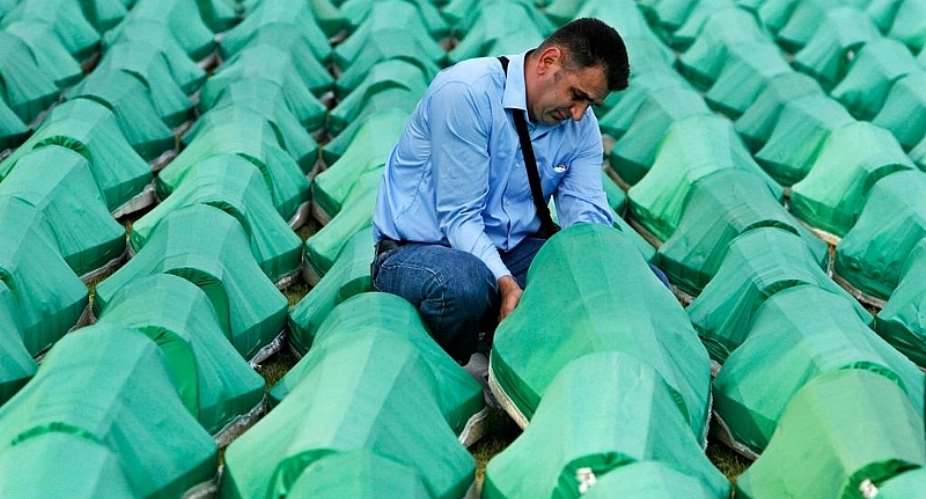A quarter of a century ago, more than 8,000 Muslim men and boys were massacred at Srebrenica by Bosnian Serb troops in one of the darkest chapters of the disintegration of Yugoslavia. The worst massacre in Europe since World War II has since been classed as genocide by the International Criminal Tribunal.
The genocidal madness of Srebrenica marked a turning point in the war in Bosnia, the most ethnically mixed of Yugoslavia's six republics. Muslims, Serbs and Croats fought each other savagely there between 1992 and 1995, leaving nearly 100,000 people dead and 2.2 million displaced.
Srebrenica was besieged by Bosnian Serb forces from the start of the conflict. The eastern mainly-Muslim town was declared a "safe area" by the United Nations in April 1993. UN peacekeepers were deployed.
On the morning of 11 July 1995, the Bosnian Serb army of Ratko Mladic finally overran Srebrenica. Tens of thousands of refugees fled to the Dutch UN peacekeeping force's compound at Potocari on the hilly town's northern outskirts.
The peacekeepers and about 5,000 refugees, mostly women and children, retreated into the UN base, while thousands of others gathered outside.
The refugees inside the base were eventually expelled into the hands of waiting Bosnian Serb troops, who started forcibly bussing people out, separating the men and boys from the women.
Days of systematic butchery
In the following days more than 8,000 Muslim men and boys were systematically butchered by the Bosnian Serb forces under Mladic's command and their bodies dumped in mass graves.
Hundreds of men who fled into the surrounding forests were rounded up and shot.
Most of the mass graves were later dug up with bulldozers and the bodies removed in an effort to conceal the scale of the crime.
Witness accounts started emerging almost immediately, with those who escaped telling harrowing tales of murder, torture and rape by the Bosnian Serb forces.
Bosnian Serb political leader Radovan Karadzic and Mladic were rapidly indicted by the International Criminal Tribunal for the Former Yugoslavia (ICTY) for genocide, crimes against humanity and war crimes.
To date, 6,880 victims of the massacre have been identified and buried – 6,643 in Potocari's memorial centre, and 237 in other cemeteries in the region surrounding Srebrenica.
International blame game
The international community has regularly been accused of having abandoned the Srebrenica victims.
In a 2000 report, UN Secretary-General Kofi Annan blamed the whole of the international community for its failure to protect Srebrenica.
The role of Dutch peacekeepers, who have been criticised for failing to protect the refugees, remains a sensitive subject in the Netherlands, where former soldiers say they have been scarred for life.
In 2002, the Dutch government resigned after the publication of a report which said it had to take some responsibility for the massacre.
Several cases have gone to court, including one successfully brought against the Hague government by the "Mothers of Srebrenica" concerning some 350 Bosnian men expelled from the Dutch base.
Families still waiting for answers
More than 1,000 victims remain unaccounted for.
Fatima Mujic lost her husband and three of her sons in the massacre. But her eldest son, Refik, has never been found. "I still think he's alive somewhere. I know about the others, but when I pray for him my hands start shaking, I don't know what to do," the 75-year-old widow told AFP.
Mujic, who now lives in a village near Sarajevo, says she "lives for the call" that the remains of Refik have been unearthed.
But a decade has passed since the last of 84 mass graves was discovered.
"Since July 2019, the remains of only 13 victims have been found," according to Emza Fazlic, spokesperson for the Missing Persons Institute. A lack of new information and witnesses has hampered the search, she said.
No hatred, no malice, no reconciliation
Ramiza Gurdic, who is now 67, also wonders about the men who killed her sons and her husband: "Did they have children?" Her boys were 17 and 20 when they died.
A quarter of a century later, she does not wish harm on the men who killed her children.
"God will give them what they deserve," she says. "No hatred, no malice, but no reconciliation either."





 "I can now see clearly with my two eyes, thanks to the generosity of Afenyo-Mark...
"I can now see clearly with my two eyes, thanks to the generosity of Afenyo-Mark...
 Election 2024: Power outages will affect NPP – Political scientist
Election 2024: Power outages will affect NPP – Political scientist
 NPP is 'a laughing stock' for luring 'poster-stickers', 'noisemaking babies' wit...
NPP is 'a laughing stock' for luring 'poster-stickers', 'noisemaking babies' wit...
 Dumsor: Matthew Opoku Prempeh must be removed over power crisis – IES
Dumsor: Matthew Opoku Prempeh must be removed over power crisis – IES
 PAC orders WA East DCE to process requests from their MP
PAC orders WA East DCE to process requests from their MP
 Defectors who ditched Alan’s Movement to rejoin NPP were financially induced – A...
Defectors who ditched Alan’s Movement to rejoin NPP were financially induced – A...
 Dumsor: Akufo-Addo has taken Ghanaians for granted, let’s organise a vigil – Yvo...
Dumsor: Akufo-Addo has taken Ghanaians for granted, let’s organise a vigil – Yvo...
 April 23: Cedi sells at GHS13.66 to $1, GHS13.07 on BoG interbank
April 23: Cedi sells at GHS13.66 to $1, GHS13.07 on BoG interbank
 GRA clarifies tax status of resident individuals earning income abroad
GRA clarifies tax status of resident individuals earning income abroad
 2024 elections: NDC to officially unveil Jane Opoku-Agyemang as running mate tom...
2024 elections: NDC to officially unveil Jane Opoku-Agyemang as running mate tom...
